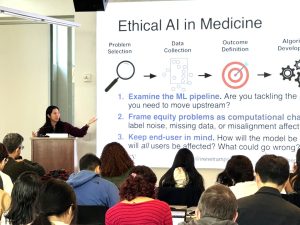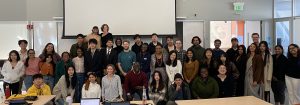By Tamara Straus
The goal of the PhD is to do original research in a specific discipline. That means in-depth and often narrow inquiries that build on academic knowledge. But for many STEM and social science graduate students, the great draw of the PhD is developing research that can have wide societal benefit—in clean water or pollution reduction, for example—and be implemented through government or business.
Since 2017, the Blum Center for Developing Economies has been enabling graduate students to develop societal benefit research through the InFEWS—Innovations at the Nexus of Food, Energy, and Water Systems—program funded by the National Science Foundation. InFEWS provides fellowships and travel stipends for students whose PhD research aims to provide lasting environmental solutions and alleviate poverty in the world’s poorest regions. The program’s mandate is to train a new generation of interdisciplinary STEM researchers and practitioners who can improve the living standards of Americans and meet the United Nation’s Sustainable Development Goals.
The requirements are broad. InFEWS Fellows must address challenges at the intersection of food, energy, and water systems. Their research must take into consideration climate variability, water, and pollution, along with changing demographics in a world where the poor and rural have insufficient access to basic resources. To meet these challenges, InFEWS Fellows are asked to engage in interdisciplinary research activities and course work, including human-centered design and lean start-up approaches, as well as pursue immersive lab and field training. Students are also expected to gain experience in needs assessment, analysis of qualitative and quantitative data, and concept testing.
This year’s cohort of InFEWS Fellows includes 37 students from 13 schools and departments at UC Berkeley, including the School of Information, College of Natural Resources, Haas School of Business, College of Engineering, and Goldman School of Public Policy. Sixty five percent of the fellows are women and 25 percent are under-represented minorities, which is typical of STEM programs that address global challenges. In addition, 25 of the 37 fellows are also in the Blum Center’s Development Engineering program, which has similar goals in terms of training engineers who want to use technological innovations to address poverty.
Below are Q&As with four current InFEWS Fellows.
Sara Glade
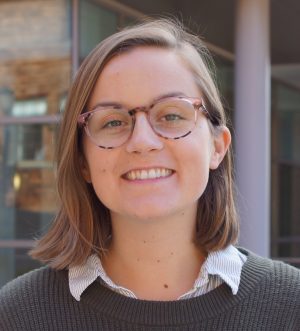 Sara Glade is a PhD student in Environmental Engineering whose InFEWS work focuses on drinking water treatment technology development and implementation.
Sara Glade is a PhD student in Environmental Engineering whose InFEWS work focuses on drinking water treatment technology development and implementation.
Why did you seek to become an INFEWS Fellow and Development Engineering student?
My exposure to Development Engineering began during my undergraduate career when I was introduced to the organization Engineers Without Borders. I became deeply invested in the chapter, working on a water supply project in Haiti and a bridge project in Nicaragua. My passion for water came to fruition in the field in Haiti, after seeing children walk miles to collect polluted water. Here I learned the potential of engineering and water to improve the quality of people’s lives, which inevitably drew me to be interested in researching water treatment technologies for disadvantaged regions.
At UC Berkeley, I have been part of many social impact driven engineering projects. In the course DE 200, I worked with Sanivation, a container-based sanitation company located in Kenya. In CE 209, I worked with Berkeley-based startup SimpleWater to survey rural communities in California with arsenic contaminated drinking water about their water and point of use treatment. I learned first-hand the challenges communities throughout the Central Valley and the U.S. face with drinking water contamination. This ignited a strong interest in using Development Engineering to work on U.S. water issues, which I carried into my research. All of these experiences, before and during Berkeley, ultimately led me to the Development Engineering program.
Throughout my time at Berkeley, I have also grown to better understand and appreciate the link between food, energy, and water systems, and this drew me to the InFEWS program. My current research has also pushed me to think critically about these connections as well.
Tell us about your current research.
My current research started in quite a unique way. A UC Davis professor visited a community in the California Central Valley, in Allensworth, and met several community members looking for appropriate arsenic treatment technology solutions. This professor then contacted my advisor, Ashok Gadgil, because the Gadgil Lab has over 10 years of experience working on a novel arsenic treatment technology called ElectroChemical Arsenic Remediation (ECAR).
On our first call with several community leaders, we were asked to help treat water on their farm for a livestock application. The development of ECAR at small scale on this farm site would be a unique opportunity for economic development in the community, for fresh food to be available nearby, and could also enable next steps of a demonstration plant and community treatment plant for drinking water. I knew this project would be perfect for my interests in U.S. water, treatment technology development, and implementation.
Thus far, I have conducted lab scale tests to understand parameters useful in designing the field trial, have developed design constraints unique to the U.S. context, have discussed the field trial design with our community partners, and have presented our work to a number of stakeholders, including local nonprofits. The next step of this work is to finish raising funds, and then implement and operate the field trial. Alongside the field trial, I plan to conduct interviews with community members to understand their perception of this new technology. Overall, I hope to increase knowledge around appropriate drinking water treatment technology development and implementation in small, low-income communities in the United States.
What are your long-term goals?
After my PhD, I would like to continue working on development and implementation of water treatment projects, either in the U.S. or internationally, and could see myself working in low-resource regions on projects that are in between basic science and commercialization. It seems amazing technologies and research that could serve the needs of disadvantaged populations sometimes get stuck in papers or at small scale. I hope to work on bridging this gap throughout my future career, with the hopes of bringing to fruition many technologies that otherwise would stay trapped in a text. I am also considering doing a policy fellowship after my PhD. From the work I have done on U.S. water thus far, I have become very interested in how policy can prohibit or enhance access to safe drinking water in affected regions.
Christopher Hyun
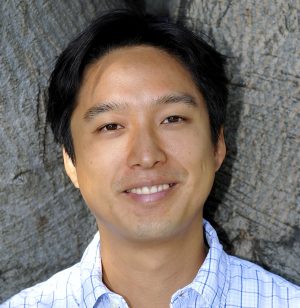 Christopher Hyun is pursuing a PhD from the Energy and Resources Group with a designated emphasis in Development Engineering; his InFEWS work focuses on water and sanitation planning.
Christopher Hyun is pursuing a PhD from the Energy and Resources Group with a designated emphasis in Development Engineering; his InFEWS work focuses on water and sanitation planning.
What drew you to the InFEWS Fellowship?
What drew me to InFEWS is its community of learning. I’ve been working in the development sector for over a decade, gaining experience in income generation, capacity building, and water- and sanitation-related research. I’ve had the privilege of working with environmental organizations and institutions on water and sanitation, such as the Centre for Science and Environment, Banaras Hindu University, IIT-Bombay, and CDD Society in India. Sanitation is not often considered an important sector at the nexus of food, energy, and water, although FEW systems thinking has the potential to help solve sanitation’s challenges; so this is an opportunity for me to learn from other scholars in the InFEWS community. Also, I am currently observing a sanitation revolution occurring in the development sector about which I am excited to share with the community as innovations unfold, integrating with an increasing number of FEW systems. Furthermore, I enjoy contributing to discussions about the relationship between technological innovation and social structures as well as general social and governance perspectives of FEWS.
What are your overall research interests?
I recently completed a research project, working with water valvemen to help improve intermittent water systems and partnering with NextDrop and the Bangalore Water Supply and Sewerage Board. As I continue with my PhD research, I hope to uncover pro-poor sanitation solutions that have long-term impacts on food, energy, and water systems in urban contexts of low- and middle-income countries. I focus on the governance of sanitation in urban India, following decision-making by international funders and government officials as well as by the engineers who design low-energy intensive technologies (such as biogas digesters) and the local farmers who reuse the wastewater and fecal sludge. I am particularly interested in capacity building for innovative sanitation solutions and how capacity building is conceptualized and implemented across scales of governance in sanitation.
Why is capacity building so important in your research?
Local officials and engineers often don’t have the capacity to make design decisions, and farmers may oppose new sanitation systems as they would rather obtain fecal sludge directly (but unsafely) from septic trucks. In my research, I aim to understand such local dynamics and to uncover ways to mitigate the gaps between scales of sanitation governance. Capacity building is often considered a solution to such challenges. I partner with the Consortium for DEWATS Dissemination (CDD) in India, internationally recognized for innovations in low-cost sanitation systems, reuse, and capacity building. I have worked closely with CDD, designing and implementing sanitation training focused on CDD’s “toilet to table” philosophy. In research, I utilize an ethnographic approach, conducting observations and interviews with stakeholders, civil society organizations, and government officials. My goal is not only to uncover how capacity building can be more effective, but more fundamentally how capacity building is being defined and implemented, including by whom and for whom. Uncovering capacity building not only informs development practice but it also helps us understand how and why technological transitions may (or may not) happen, which I believe is at the heart of both Development Engineering and InFEWS.
George Moore
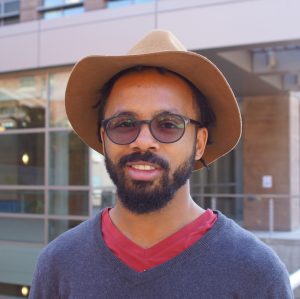 George Moore is a Mechanical Engineering and Development Engineering doctoral student whose InFEWS research focuses on food, energy, water systems with the Pinoleville Pomo Nation of Northern California.
George Moore is a Mechanical Engineering and Development Engineering doctoral student whose InFEWS research focuses on food, energy, water systems with the Pinoleville Pomo Nation of Northern California.
What drew you to research on sustainable energy and water resources?
My first opportunity to work on InFEWS-related research came during my summer research internship at the University of Michigan in 2015. There, I studied a sustainable manufacturing project for an underdeveloped community in Uganda. Reflecting on my own experience growing up as a minority in the rural South, this project made me feel personally connected and empathetic towards underserved communities globally. I read about several case studies where organizations or researchers engaged with communities in developing countries and the original plan of action had to be altered to accommodate for context and cultural values that could not have been foreseen. Although this seems obvious to me now, I was surprised and grew curious about the methods used to design for communities like these in ways that would precipitate not only tangible goods, but also sustainable practices related to the handling of primal needs like food, water, and energy resources.
How did you come to work with the Pinoleville Pomo Nation (PPN) of Northern California?
As a PhD student working with Professor Alice Agogino and two other graduate students, I helped plan field research conducted at the PPN’s annual Big Time festival in Summer 2017. There, we were able to observe and engage with the PPN community in their own sacred environment. In addition, we provided an exercise that encouraged PPN members, and others in attendance, to articulate their opinions of the current problems within the PPN community as well as potential solutions to those problems. We offered five suggestive themes to categorize these responses, in which most of them cater to the vision of the InFEWS initiative: Food, Water, Energy, Education, and Well Being.
Since then, we have continued to work with PPN community leaders to establish how to progress with a project that would align the needs of the PPN community with those of our research goals. The PPN community has expressed interest in STEAM (Science, Technology, Engineering, Art, and Math) Education, and over the past year has started an Academic Success Center, invested in a makerspace, and finished the second year of its annual STEAM summer camp. With this in mind, we have re-framed our research scope to emphasize InFEWS themes within the context of STEAM education and the design of culturally sensitive makerspaces.
What are your long-term goals?
I’m genuinely excited to be working on a project that aligns so much with my personal and academic goals. I think that success for the PPN project requires our roles as facilitators to become obsolete—creating lasting change that will continue long after our presence is removed. Also, we hope that whatever is produced from this collaboration upholds the values of the community. To achieve that goal, we have been careful to minimize the ideas and subtle influences that we might impose as researchers.
Lorenzo Rosa
Lorenzo Rosa 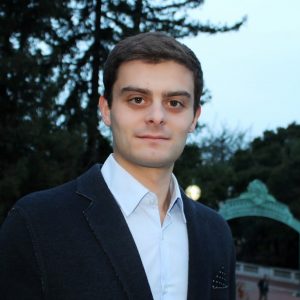 is a PhD candidate in the Department of Environmental Science, Policy, and Management whose InFEWS research investigates where water scarcity may limit energy and food systems.
is a PhD candidate in the Department of Environmental Science, Policy, and Management whose InFEWS research investigates where water scarcity may limit energy and food systems.
How have your academic interests informed your InFEWS work?
My training is in engineering, hydrology, and energetics. Before pursuing a PhD at UC Berkeley, I received master’s and bachelor’s degrees in Environmental Engineering from Polytechnic University of Milan, Italy and studied abroad at KTH Royal Institute of Technology and the University of Virginia. Since 2017, I have been awarded an Ermenegildo Zegna Founder’s Scholarship. Over the years, while studying the chemical processes of engineering as they relate to the environment, I noticed that the biggest environmental polluters are the food and energy sectors. This got me thinking I should focus on energy and food systems and hydrology to develop a framework using water balance.
Why focus on water balance?
An often-overlooked aspect of water requirements for economic activities is that water is a limited resource and some of these activities could be constrained by water scarcity to the point of limiting the development of some assets. For instance, lack of water resources can impede the extraction of some minerals, the generation of electricity from coal fired and solar power plants, the production of biofuels, or the closure of the yield gap in agricultural land. In all of these cases, water scarcity might be a limit to these activities.
While substantial additional water will be required to support future food and energy production, it is not clear whether and where local freshwater availability is sufficient to sustainably meet future water consumption. The extent to which irrigation can be expanded within presently rain fed cultivated land without depleting environmental flows remains poorly understood. It also remains unclear where and to what extent new water demanding energy projects, such as post- combustion CCS and hydraulic fracturing, might be constrained by local water availability.
How does your research on water scarcity differ from other assessments?
Previous efforts have assessed the water footprint of energy and food systems from the life cycle assessment perspective, focusing on a comprehensive accounting of all water costs associated with production and processing, but without examining the availability or source of the required water. The novelty of my research consists in the assessment of the impacts of energy and agricultural systems on the local water balance using a hydrologic approach, identifying the regions in which new forms of potential water consumption from the energy sector could compete with agriculture and other human activities, and areas in which water demand from energy and/or food systems could not be sustainably met because of water scarcity.
I believe neglecting water availability as one of the possible factors constraining the development of economic activities may lead to unaccounted business, social, and environmental risks. By adopting a hydrologic perspective that considers water availability and demand together, my aim is that decision makers, investors, and local communities can better understand the water and food security implications of energy and agricultural production while avoiding unintended environmental consequences.
Tell us about your dissertation work.
My dissertation will provide a quantitative framework to make informed investment decisions involving natural assets that are susceptible to water risks. As such, I am currently investigating where water scarcity may limit hydraulic fracturing and food production–thus creating risks for local populations and investors. My goal is to identify global hotspots of where human activities compete for water allocations, potentially creating social, environmental, and economic risks. My belief is that the limited understanding of the potential impacts of human activities on water resources prevents the implementation of a sound management plan for a sustainable human development. For example, we are depleting ecosystems in rivers because we are taking too much water from them. The classic example is the Colorado River. It runs dry and the water does not reach the ocean. Another example is non-renewable ground water mining. Water that was stored millennia ago is being used unsustainably in India, Pakistan, and Central California, among other places.
They key is understanding where we can increase water production, because we know the population is going to reach 9.5 billion by 2050. We’ll need to add 50 percent of current water production to feed all these people. And so we’ll need to figure out where we can (and cannot) produce more food with water in a sustainable way. In other words, we’ll need to move production where the water is or swap crops or use less water-intensive crops or transport water—so that we can increase food production for 2.8 billion people.
The InFEWS program is supported by the National Science Foundation (infews.berkeley.edu ; DGE # 1633740).

